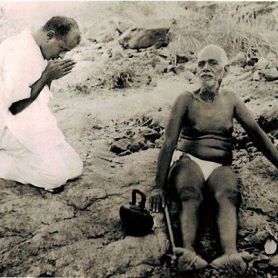Tag Archives: ADVAITA
All Are In God
“Whether you make dhyana of God or of Self, it is immaterial. The goal is the same. But you cannot escape the Self. You want to see God in all, but not in yourself? If all are God, are you not included in that all?” Sri Ramana speaking in Talk 254 (Talks with Sri Ramana Maharshi).
Devotee: Is the Universal Soul (Paramatma) always different from us?
Sri Ramana: That is the common belief, but it is wrong. Think of Him as not different from you, and then you achieve identity of Self with God. (Talk 31).
Free style interpretation of Ashthavakra Gita verses 3.9 to 3.14
Whether honored or tormented, in laughter or tears
the wise man, who is aware of his Self-Nature
does not see the body and mind as his own
and releases them to their natural ways.
Freedom from duality comes from Self-Knowledge
and reveals the joy that takes one beyond all sorrows.
________________________________
Here are the original verses from the Asthavakra Gita 3.9-3.14
Whether feted or tormented, the wise man is always aware of his supreme self-nature and is neither pleased nor disappointed. 3.9
The great-souled person sees even his own body in action as if it were someone else’s, so how should he be disturbed by praise or blame? 3.10
Seeing this world as pure illusion, and devoid of any interest in it, how should the strong-minded person feel fear, even at the approach of death? 3.11
Who can be compared to the great-souled person whose mind is free from desire even in disappointment, and who has found satisfaction in self-knowledge? 3.12
How should a strong-minded person who knows that what he sees is by its very nature nothing, consider one thing to be grasped and another to be rejected? 3.13
An object of enjoyment that comes of itself is neither painful nor pleasurable for someone who has eliminated attachment, and who is free from dualism and from desire. 3.14
Worries Do Not Belong To You!
The basic tenet of Advaita-Vedanta is that our original nature, the nature of the Self, is Sat-Chit-Ananda-Nityam-Purnum. Sat means Existence. Chit refers to Consciousness. Ananda means Bliss. Nityam mean Eternal. Purnum means whole or complete.
These are not qualities of the Self but its very nature as One monolithic whole. The Self is One without a second, A Mass of Conscious Bliss that is Eternal and Whole. When we experience the Self, we see that the ancient sages were very precise in describing our nature. It is unmistakable and leaves no room for any thought or doubt. Sages teach us that what comes and goes is not our true nature. What is transient has no permanent power or hold on us.
Although we view our personality as made up of mental traits and thoughts, Advaita teaches us that even our mind and thoughts are transient as they are constantly undergoing change. If our identity is based on mental fluctuations, suffering is the natural result.
Sri Ramana, the Sage of Arunachala, taught that through reflection, introspection, and self- inquiry, we can see through our mental conditioning, be free of it, and go beyond it.
Then we see that what comes and goes is not our nature.
Here is a conversation with Sri Ramana and a visitor to illustrate this point.
A visitor said: “I suffer from worries without end; there is no peace for me…” Sri Ramana asked: “Do these worries affect you in sleep?” The visitor admitted that they did not.
Sri Ramana asked him again: “Are you the very same man now, or are you different from him that slept without any worry?”
The visitor said, “Yes, I am the same person.”
Sri Ramana then said: “Then surely those worries do not belong to you. It is your own fault if you assume that they are yours.” (From Maha Yoga by K. Lakshmana Sarma).
The Self Cannot Be Found In Books
“You may go on reading any number of books on Vedanta. They can only tell you ‘Realize the Self’. The Self cannot be found in books. You have to find it for yourself in yourself.” Bhagavan Ramana in Gems ~ Chapter 8.
Sri Ramana here states the truth directly and unmistakably. No matter how many books one reads, one cannot gain Self-Realization.
Reading, thinking, and conceptualizing involve mental activity. Yet, it is this mental activity that distracts us and covers up the pure essence of being.
It is the mind itself that has to subside into the Heart and dissolve in it. Upon the merging of the mind in the Heart, the Self, recognition of our true nature is instantaneous. With the mind absent as the intermediary, the wordless Realization is immediate. One recognizes and says that “It has been Me all along. I am the Self.”
This recognition is beyond thoughts, words, and concepts. We use the words only to indicate that our real Self stands always Self-revealed.
Bhagavan Ramana teaches that once we become conscious of our power of attention to scan its own nature, we should focus on that.
in the classic quote given at the beginning of the article, Bhagavan Ramana emphasizes the role of deliberate and conscious introversion of the mind by shifting our attention from perceptions to the perceiver via self-inquiry.
OM Shanti!
Namaste
Note: The featured picture is from Mirela Skerbic on Facebook
Sage of Arunachala
The greatest yogis of the day and Shankracharyas came and visited Bhagavan Ramana.
They saw an ordinary frail man, who had nothing, sitting there on the rocks.
Bhagavan Ramana did not try to impress anyone.
The highest yogic adepts and saints instantly saw that they were in the presence of the Eternal Presence ItSelf.












You must be logged in to post a comment.